dejar a los peces en el agua
escuchando silencios ... pretendidos haikus ... nacen desde la floresta ...
Los peces nacen en el agua, el hombre nace en el Tao.Si los peces, nacidos en el agua, buscan la sombra profunda del estanque o la alberca, todas sus necesidades son satisfechas.Si el hombre, nacido en el Tao, se hunde en la profunda sombra de la no-acción, para olvidar la agresión y las preocupaciones, no le falta nada, su vida es segura.
Moraleja: "Todo lo que necesita el pez es perderse en el agua.Todo lo que necesita el hombre es perderse en el Tao".
Moraleja: "Todo lo que necesita el pez es perderse en el agua.Todo lo que necesita el hombre es perderse en el Tao".
9 mar 2019
26 ago 2016
16 ago 2016
Instead of doing a hundred things half-heartedly, do one thing whole-heartedly.

Title: Moon-Water Bodhisattva Kuanyin
Place: China, Tangut State of Xi -Xia, Khara-Khoto
Date: Early 12th century
Be who you are, but don’t hurt others.

Title: Buddha Amitabha
Place: China, Tangut State of Xi -Xia, Khara-Khoto
Date: 13th - 14th century
Technique: roll on silk
There are realistic and religious issues in human life. The solution to the realistic issues only meets temporary needs, yet that to the religious issues can satisfy the permanent demands. Master Jiqun

Double-Headed Buddha
Place: China, Tangut State of Xi-Xia, Khara-Khoto
Date: 13th-14th century
Archaeological site: Suburgan, Khara-Khoto
Material: clay, with mineral paints and gilding
Hay temas realistas y religiosos en la vida humana. La solución a los problemas realistas sólo satisface las necesidades temporales, sin embargo, la de las cuestiones religiosas puede satisfacer las demandas permanentes.
When we realize the Dhamma, wherever we sit we know Dhamma, wherever we are we hear the Buddha’s teaching. When we understand Dhamma, the Buddha is within our mind, the Dhamma is within our mind, and the practice leading to wisdom is within our own mind. Having the Buddha, the Dhamma and the Sangha within our mind means that whether our actions are good or bad, we know clearly for ourselves their true nature.
– Ajahn Chah
– Ajahn Chah
13 ago 2016
If the eye never falls asleep,
all dreams cease by themselves.
If the spirit retains its unity,
all things are of one essence.
When this essence is seen,
in an instant we are free.
We return to the origin
and remain that which we are.
— Seng-ts’an
***
Si el ojo nunca duerme,
todos los sueños cesan por sí mismos.
Si el espíritu conserva su unidad,
todas las cosas son de una esencia.
Cuando se observa esta esencia,
en un instante somos libres.
Volvemos al origen
y seguimos siendo lo que somos.
- Seng-ts'an
all dreams cease by themselves.
If the spirit retains its unity,
all things are of one essence.
When this essence is seen,
in an instant we are free.
We return to the origin
and remain that which we are.
— Seng-ts’an
***
Si el ojo nunca duerme,
todos los sueños cesan por sí mismos.
Si el espíritu conserva su unidad,
todas las cosas son de una esencia.
Cuando se observa esta esencia,
en un instante somos libres.
Volvemos al origen
y seguimos siendo lo que somos.
- Seng-ts'an
12 ago 2016
In the spring scenery there is nothing superior, nothing inferior; flowering branches grow naturally, some short, some long. From this standpoint, you see, everybody is seen to be a perfect manifestation of the godhead or of the void or whatever you want to call it. Everybody. — Alan Watts
En el paisaje de primavera no hay nada superior, nada inferior;
ramas con flores crecen naturalmente, algunas cortas, algunas largas.
Desde este punto de vista,
todo el mundo es una manifestación perfecta de la divinidad
o del vacío o como quieran llamarlo.
Cada uno.
- Alan Watts
One can only be moral because you like to do it that way. There really is no other reason whatsoever. And to try and find other reasons always perverts morality. — Alan Watts
Uno sólo puede ser moral porque te gusta hacerlo de esa manera. Realmente no hay otra razón. De intentar encontrar otras razones siempre pervierte la moral.
- Alan Watts
Just as the balances of a garden in which the bird eats the worms and the snail eats the lettuce, all these processes of conflict build up the ongoing miracle of the garden itself. So in the same way, things that you see in yourself as neuroses, as forms of ill health, as things that you shouldn’t be, they are your slugs and worms. — Alan Watts
Al igual que los balances de un jardín en el que el ave come los gusanos y el caracol come la lechuga, todos estos procesos de conflicto ayudan a reconstruir el milagro de vivir en el propio jardín. Así de la misma manera, las cosas que se ven en sí mismas como neurosis, como formas de mala salud, como las cosas que no deben ser, ellas son sus babosas y gusanos.
- Alan Watts
It is not enough to wish from time to time that you could be free of samsara. That idea must pervade your stream of thinking, day and night. A prisoner locked in jail thinks all the time about different ways of getting free—how he might climb over the walls, ask powerful people to intervene, or raise money to bribe someone. So, too, seeing the suffering and imperfection of samsara, never stop thinking about how to gain liberation, with a deep feeling of renunciation. – Dilgo Khyentse Rinpoche from the book “The Heart of Compassion: The Thirty-seven Verses on the Practice of a Bodhisattva”
There is not one scrap of [your body] that was with you 10 years ago. It has all been rebuilt, reorganised, completely repaired and renewed. Then who are you? You are a pattern, you see. You are a process that is identifiable and recognisable. You face in a certain way. You hair in a certain way. You eye in a certain way. And you behave in a certain way. So we recognise you. — Alan Watts
No hay ni una pizca de [tu cuerpo] que estuvo contigo hace 10 años. Todo ha sido reconstruido, reorganizado, completamente reparado y renovado. ¿Entonces, quién eres? Eres es un patrón, que se ve. Eres un proceso que es identificable y reconocible. Te enfrentas de una manera determinada. Tu cabello de una manera determinada. Tu ojo de una manera determinada. Y te comportas de una manera determinada. Por eso te reconocemos.
- Alan Watts
- Alan Watts
10 ago 2016
Hongzhi Zhengjue
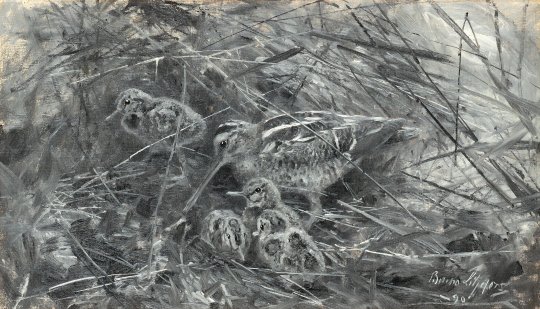
Withdraw now from
the invisible pounding and weaving
of your ingrained ideas.
If you want to be rid of this
invisible turmoil, you must just sit
through it and let go of everything.
Attain fulfillment and illuminate thoroughly.
Light and shadow altogether forgotten.
Drop off your own skin,
and the sense-dusts will be fully purified.
The eye then readily discerns the brightness.
— Hongzhi Zhengjue
***
Retirate ahora
del golpeteo invisible y el tejido
de tus ideas arraigadas.
Si deseas deshacerte de esta
agitación invisible, tendrás que sentarte
a través de ella y dejar todo de lado .
Llegar a realizarse e iluminar a fondo.
Luz y sombra por completo en el olvido.
Deja tu propia piel,
y los sentidos-polvos estarán completamente purificados.
El ojo luego discierne fácilmente el brillo.
- Hongzhi Zhengjue
art ... Bruno Liljefors (1860-1939) - Woodcock with chicks, oil on canvas, 32 x 56 cm.
When you do something, you should burn yourself completely, like a good bonfire, leaving no trace of yourself. – Shunryu Suzuki
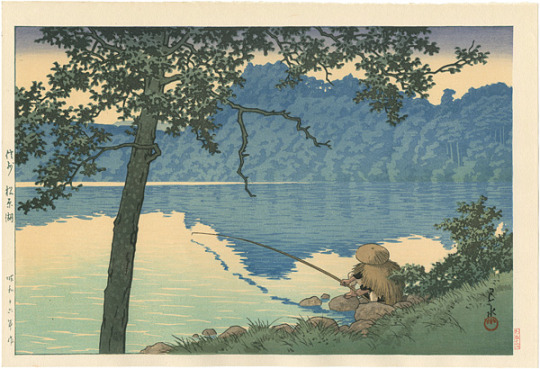
Kawase Hasui, Matsubara Lake, 1941
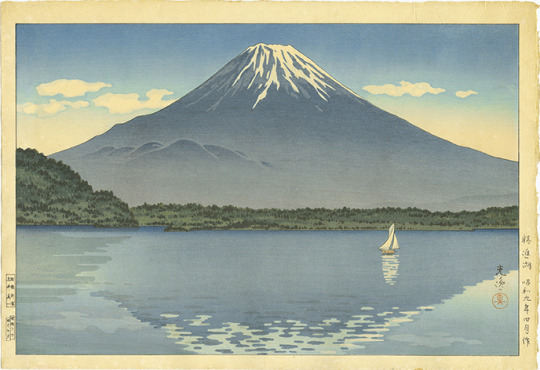
Tsuchiya Koitsu, Lake Shojin, 1934
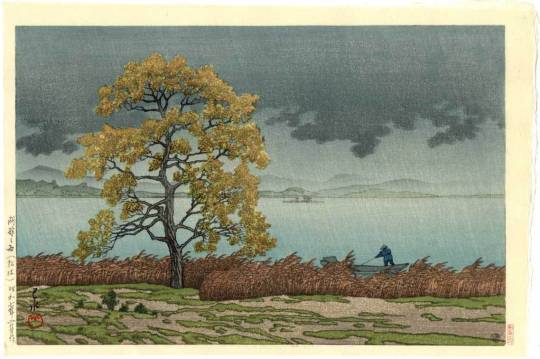
Kawase Hasui, Rain on Lake Matsume, 1932
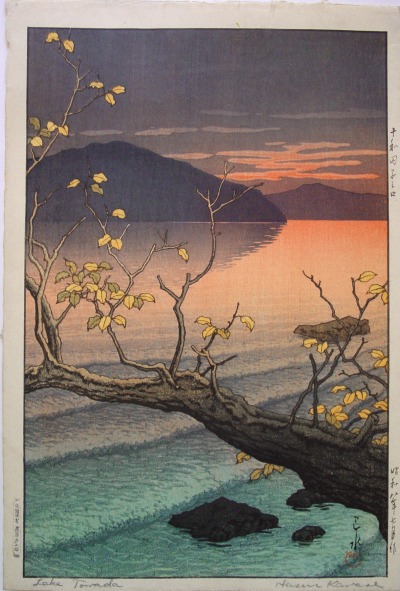
Kawase Hasui, Nenokuchi, Towada, 1933

Kawase Hasui, Lake Ezu in Kumamoto, 1923
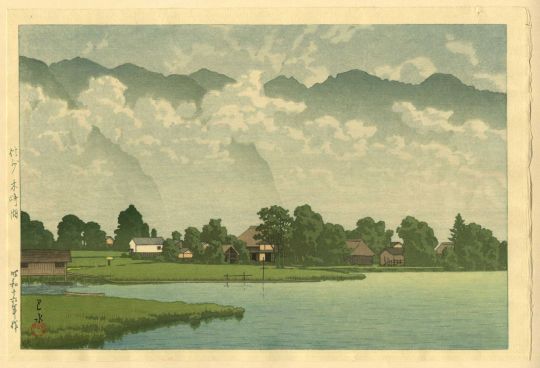
Kawase Hasui, Kisaki Lake in Shinsu, 1941
Nisargadatta Maharaj
M: Each moment contains the whole of the past and creates the whole of the future.
Q: But past and future exist?
M: In the mind only. Time is in the mind, space is in the mind. The law of cause and effect is also a way of thinking. In reality all is here and now and all is one. Multiplicity and diversity are in the mind only….
Q: Your reduction of everything to dream disregards the difference between the dream of an insect and the dream of a poet. All is dream, granted. But not all are equal.
M: The dreams are not equal, but the dreamer is one. I am the insect. I am the poet—in dream. But in reality I am neither. I am beyond all dreams. I am the light in which all dreams appear and disappear. I am both inside and outside the dream…I am what I am before, during and after the dream. But what I see in dream, l am not.
Q: If both dream and escape from dream are imaginings, what is the way out?
M: There is no need of a way out! Don’t you see that a way out is also a part of the dream? All you have to do is to see the dream as dream.
Q: If I start the practice of dismissing everything as a dream where will it lead me?
M: Wherever it leads you, it will be a dream. The very idea of going beyond the dream is illusory. Why go anywhere? Just realise that you are dreaming a dream you call the world, and stop looking for ways out. The dream is not your problem. Your problem is that you like one part of your dream and not another. Love all, or none of it, and stop complaining. When you have seen the dream as a dream, you have done all that needs be done.
— Nisargadatta Maharaj
Q: But past and future exist?
M: In the mind only. Time is in the mind, space is in the mind. The law of cause and effect is also a way of thinking. In reality all is here and now and all is one. Multiplicity and diversity are in the mind only….
Q: Your reduction of everything to dream disregards the difference between the dream of an insect and the dream of a poet. All is dream, granted. But not all are equal.
M: The dreams are not equal, but the dreamer is one. I am the insect. I am the poet—in dream. But in reality I am neither. I am beyond all dreams. I am the light in which all dreams appear and disappear. I am both inside and outside the dream…I am what I am before, during and after the dream. But what I see in dream, l am not.
Q: If both dream and escape from dream are imaginings, what is the way out?
M: There is no need of a way out! Don’t you see that a way out is also a part of the dream? All you have to do is to see the dream as dream.
Q: If I start the practice of dismissing everything as a dream where will it lead me?
M: Wherever it leads you, it will be a dream. The very idea of going beyond the dream is illusory. Why go anywhere? Just realise that you are dreaming a dream you call the world, and stop looking for ways out. The dream is not your problem. Your problem is that you like one part of your dream and not another. Love all, or none of it, and stop complaining. When you have seen the dream as a dream, you have done all that needs be done.
— Nisargadatta Maharaj
9 ago 2016
kukai
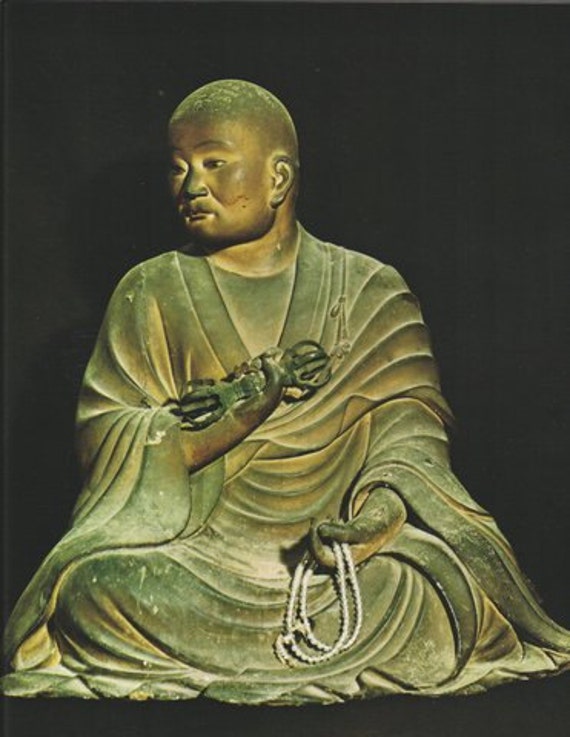
"Twelve years after Kyoto was founded, a young priest named Kukai returned from a brief sojourn in China to establish the Shingon Sect of Buddhism. Over the centuries, this new sect was to become one of the largest and most popular in Japan, and its founder's reputation was to grow apace. Recognized in his own day as a master calligrapher and an accomplished sculptor, Kukai is revered today as the inventor of the kana syllabary, the basis of written Japanese. Legend also credits Kukai, in this ninth-century wood carving, with the introduction of tea to Japan."
Samantabhadra
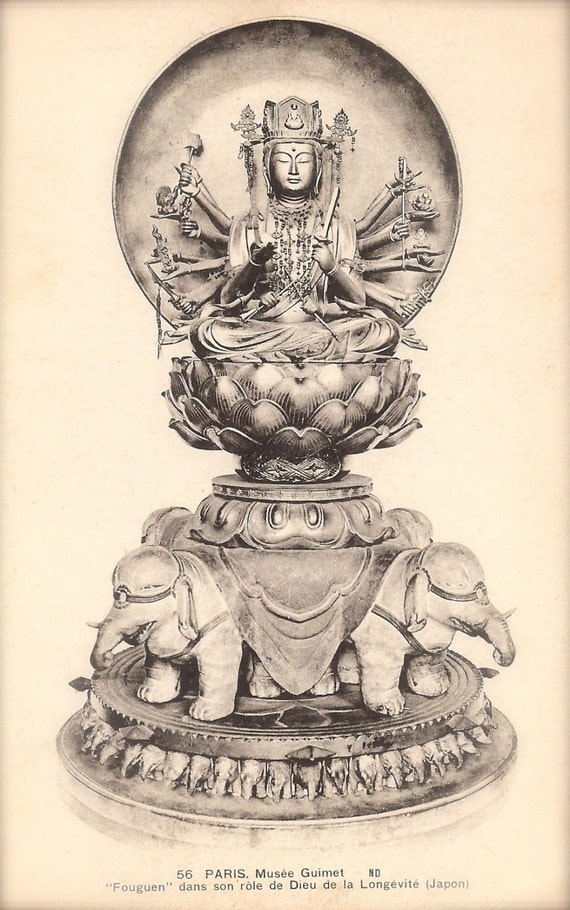
Samantabhadra (Sanskrit, "Universal Worthy"), is a bodhisattva in Mahayana Buddhism associated with practice and meditation. Together with Gautama Buddha and his fellow bodhisattva Mañjuśrī, he forms the Shakyamuni trinity in Buddhism. He is the patron of the Lotus Sutra and, according to the Avatamsaka Sutra, made the ten great vows which are the basis of a bodhisattva. In China, Samantabhadra is associated with action, whereas Mañjuśrī is associated with prajñā. In Japan, this bodhisattva is often venerated by the Tendai and in Shingon Buddhism, and as the protector of the Lotus Sutra by Nichiren Buddhism.
Suscribirse a:
Entradas (Atom)





































